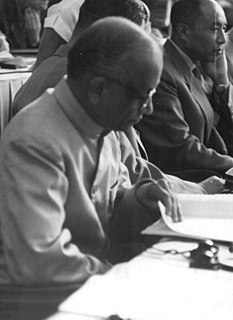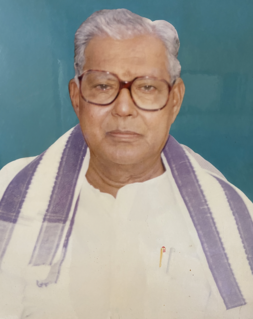Related Research Articles

The Communist Party of India (Marxist) is a communist political party in India. It is one of the national parties of India. The party emerged from a split from the Communist Party of India (CPI) on 7 November, 1964.

The Communist Party of India (Marxist–Leninist) was an Indian communist party formed by the All India Coordination Committee of Communist Revolutionaries (AICCCR) at a congress in Calcutta in 1969. The foundation of the party was declared by Kanu Sanyal at a mass meeting in Calcutta on 22 April, Vladimir Lenin's birthday. Later the party splintered into several Naxalite groups.
Communist Party of India (Marxist–Leninist) Janashakti, abbreviated CPI (ML) Janashakti, was a communist political party in India. In 2013, CPI (ML) Jansakthi merged into CPIML.
Andhra Pradesh Coordination Committee of Communist Revolutionaries (APCCCR) was a leftist split from the Communist Party of India (Marxist) in the Indian state of Andhra Pradesh. The leader of the group was T. Nagi Reddy, who was a member of the legislative assembly in AP at the time. Other leading figures were D.V. Rao, Chandra Pulla Reddy and Kolla Venkaiah. Both Reddy and Rao had been active in the Telangana armed struggle, and Rao had formulated the "Andhra Thesis" of the Communist Party of India (CPI).

Tarimela Nagi Reddy was a communist politician from Andhra Pradesh, India. He was born in a wealthy family in Anantapur district of Andhra Pradesh. He completed his schooling from the Rishi Valley School India, founded by Andhra philosopher Jiddu Krishnamurti. He would later study at Loyola College in Chennai and at Banaras Hindu University in Varanasi. During his student days, he got involved with nationalism and Marxism. His political activities got him jailed in 1940, 1941 and 1946. He revolted against his father who was a landlord and donated his land of over 1000 acres to landless labourers.

Khammam Lok Sabha constituency is one of the 17 Lok Sabha constituencies in Telangana state in southern India.
Jalagam Vengal Rao or Jalagam Vengala Rao was for much of his life a member of the Indian National Congress and was the Chief Minister of the Indian state of Andhra Pradesh which is now divided into two states Telangana and Andhra Pradesh.
Kondapalli Seetharamaiah was a senior communist leader and Maoist organizer in India.

Makineni Basavapunnaiah BA was an Indian Communist leader who was a member of Politburo of the Communist Party of India (Marxist). He was also the editor of the central organ of CPI (M), People's Democracy magazine. He was a member of the Rajya Sabha for 14 years from 3 April 1952 to 2 April 1966.
Baddam Yella Reddy was an Indian communist politician from Telangana. He was one of the prominent leaders in the Telangana armed struggle against the Nizam regime.
Thammineni Veerabhadram is an Indian politician, belonging to the Communist Party of India (Marxist). As of 2011 he was a Central Committee member of the party.
Lavu Balagangadhara Rao was an Indian politician. He served as the Secretary of the Andhra Pradesh State Committee of the Communist Party of India (Marxist) between May 1985 and November 1991.
Central Organising Committee, Communist Party of India (Marxist–Leninist) was a communist party in India, one of the main splinter factions of the original Communist Party of India (Marxist–Leninist). COC, CPI(ML) occupied a middle position between the pro-Charu Majumdar group led by Mahadev Mukherjee and the anti-Majumdar group led by Satyanarayan Singh. Failing to articulate a common ideological position, COC, CPI(ML) soon suffered internal divisions and splits. Two of the splinter groups of COC, CPI(ML) in Andhra Pradesh are predecessors of the present-day Communist Party of India (Maoist).

In 1964 a major split occurred in the Communist Party of India. The split was the culmination of decades of tensions and factional infighting. When India became independent in 1947, differences arose of how to adapt to the new situation. As relations between the Nehru government and the Soviet Union improved, a faction that sought cooperation with the dominant Indian National Congress emerged within CPI. This tendency was led by S.A. Dange, whose role in the party hierarchy became increasingly controversial. When the Sino-Indian War broke out in 1962 Dange's opponents within CPI were jailed, but when they were released they sought to challenge his leadership. In 1964 the party was finally divided into two, with the left faction forming the Communist Party of India (Marxist). The split had a lot of regional variations. It also impacted other organizations, such as trade union and peasant movements. The split has been studied extensively by scholars, who have sought to analyze the various domestic and international factors involved.

Devulapalli Venkateswara Rao (1917-1984) was an Indian politician. He was a member of the 2nd Lok Sabha of India. He represented the Nalgonda constituency of Telangana.

Bodepudi Venkateswara Rao born April 2, 1922 was an Indian political leader. A member of the legislative assembly continuously for three terms serving the “Communist Party of India (Marxist)” [CPI(M)], Venkateswara Rao was previously a social reformer from the state of Telangana. He gained a lot of prominence in the state and the country for his persistent efforts to improve the lives of the downtrodden. He won the hearts of millions of peasants and farmers from Khammam District, Telangana, India.
References
- 1 2 3 4 5 6 7 8 9 People's Democracy. Obituary: Comrade YRK
- 1 2 The Hindu. CPI(M) mourns former MP
- ↑ Election Commission of India. STATISTICAL REPORT ON GENERAL ELECTIONS, 1977 TO THE SIXTH LOK SABHA
- ↑ Rediff on the Net. Naxalites kill 12, including five cops, in Bihar
- ↑ TelanganaState.com. Left 'no' to monitoring panel
- 1 2 The Hindu. Veteran CPI (M) leader YRK passes away